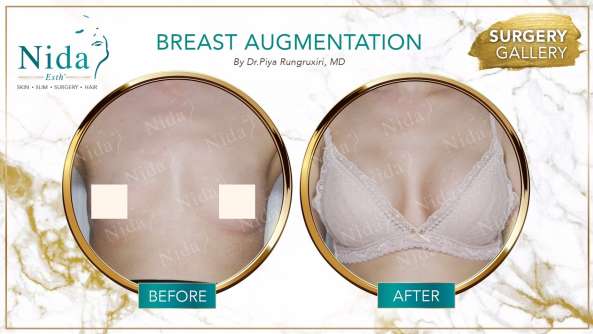
Case 1
Problem: Little breast skin, no grooves. Want natural breasts looking size that fit with body shape and has obvious grooves.
Technique: Breast Hybrid Augmentation
Breast Implant size: Mentor 300 cc.
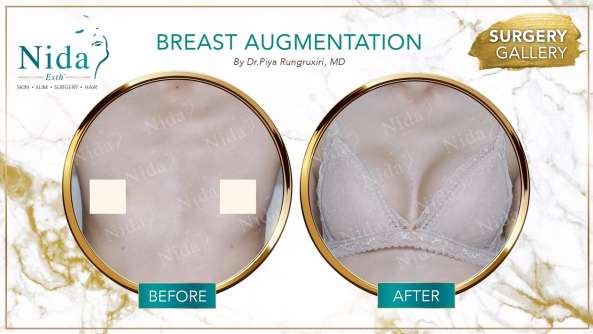
Case 2
Problem: Both breasts have different height levels and are wide apart from each other. Want the breasts to be closer to each other.
Technique: Breast Dual Plane Augmentation
Breast Implant size: Mentor 300 cc.
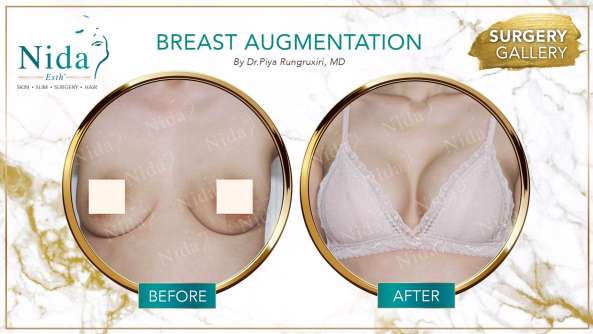
Case 3
Problem: Saggy breasts from breastfeeding. Want to lift the breasts more.
Technique: Breast Lift Augmentation
Breast Implant size: Mentor 250 cc.
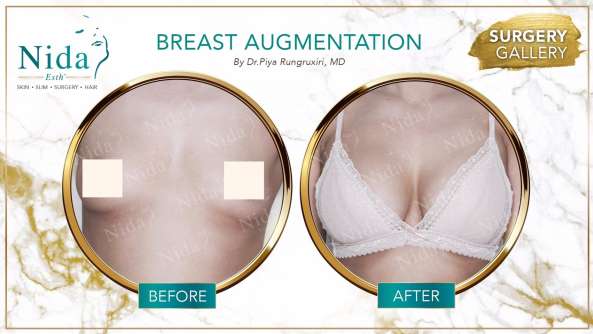
Case 4
Problem: Flat breasts. Want a breast implant for confident in wearing clothes and better appearance.
Technique: Breast Hybrid Augmentation
Breast Implant size: Mentor 250 cc
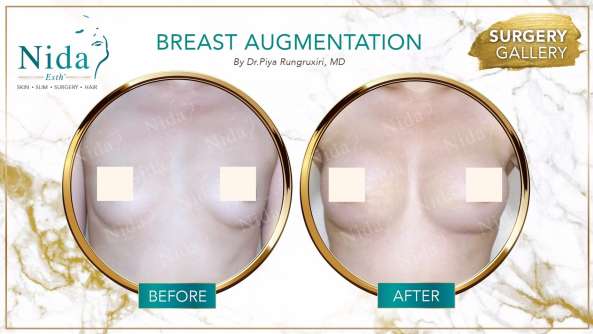
Case 5
Problem: Already have breasts but want a bigger size and want some grooves.
Technique: Breast Hybrid Augmentation
Breast Implant size: Mentor 300 cc.
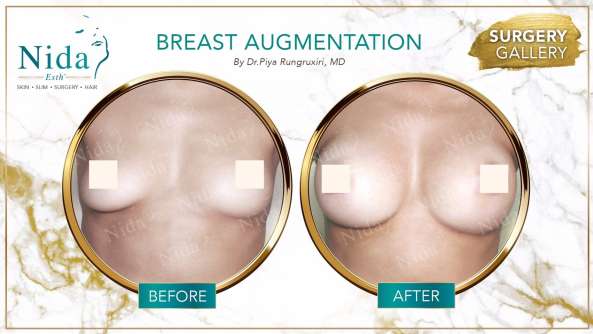
Case 6
Problem: Saggy breasts from having child and aging. Want a bigger size and more lifted breast to look better when wearing clothes and going on events.
Technique: Breast Lift Augmentation
Breast Implant size: Mentor 400 cc.
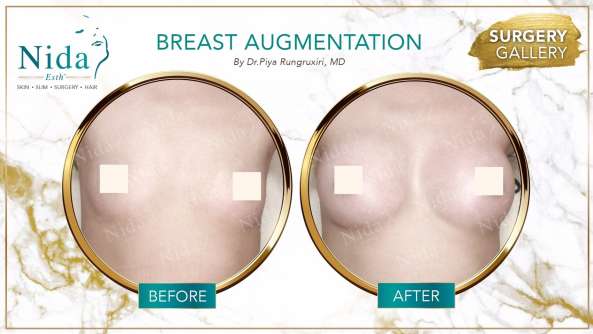
Case 7
Problem: A transgender that wants natural looking women breasts
Technique: Breast Hybrid Augmentation
Breast Implant size: Mentor 300 cc.
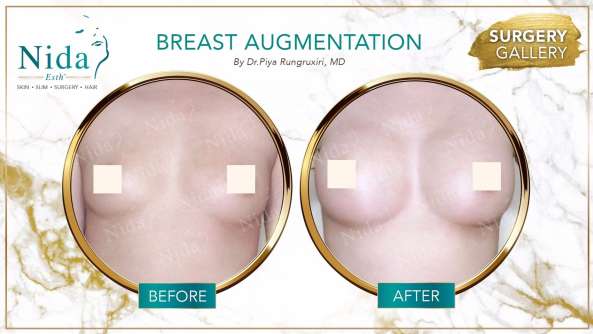
Case 8
Problem: Two breasts are unequal. Want the levels to be equal and bigger breasts that fit with body shape
Technique: Breast Dual Plane Augmentation
Breast Implant size: Mentor 350 cc.
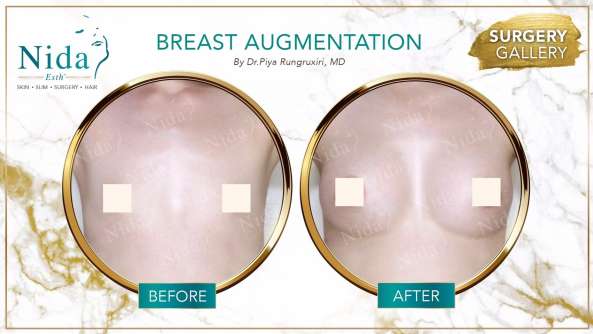
Case 9
Problem: Not confident in wearing clothes due to flat breasts. Want a bigger natural looking breast.
Technique: Breast Augmentation
Breast Implant size: Mentor 300 cc.
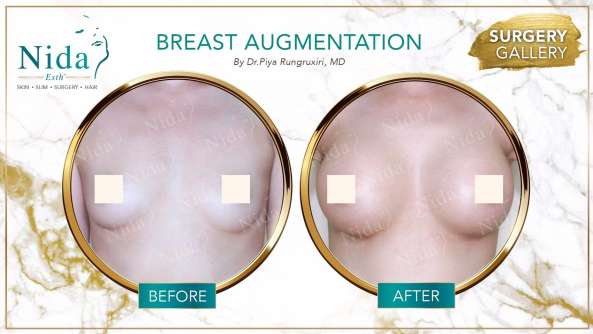
Case 10
Problem: Before the breast was A size cup. She likes wearing clothes that show off her breasts, so she wants to upsize her breast to C cup.
Technique: Breast Dual Plane Augmentation
Breast Implant size: Mentor 300 cc.

Case 11
Problem : This is a case of a 23-year-old female patient presented with concerns about having relatively small breast tissue and an unclear inframammary fold. She wishes to enhance the contour to achieve a more aesthetically pleasing and natural-looking breast mound.
Technique : Breast augmentation using the Triple Plane or Dual Plane Subfascial technique.
Breast Implant size : Motiva Ergonomix High Profile ERSF 275 CC.

Case 12
Problem : This is a case of a 23-year-old female patient presented with concerns about having relatively small breast tissue and an unclear inframammary fold. She wishes to enhance the contour to achieve a more aesthetically pleasing and natural-looking breast mound.
Technique : Breast augmentation using the Triple Plane or Dual Plane Subfascial technique.
Breast Implant size : Motiva Ergonomix High Profile ERSF 275 CC.

Case 13
Problem : This is a case of a 30-year-old female patient who has had one child. She presented with mild breast ptosis and relatively small breast volume. The upper breast mound lacked fullness, with tissue concentrated mainly in the lower portion of the breast. In this case, breast augmentation alone was performed without the need for a lift.
Technique : Breast augmentation using the Triple Plane or Dual Plane Subfascial technique.
Breast Implant size : Motiva Ergonomix ERSD 265 CC.

Case 14
Problem : This is a case of a 30-year-old female patient who has had one child. She presented with mild breast ptosis and relatively small breast volume. The upper breast mound lacked fullness, with tissue concentrated mainly in the lower portion of the breast. In this case, breast augmentation alone was performed without the need for a lift.
Technique : Breast augmentation using the Triple Plane or Dual Plane Subfascial technique.
Breast Implant size : Motiva Ergonomix ERSD 265 CC.

Case 15
Problem : This is a case of a 25-year-old female patient with very minimal natural breast tissue. She wished to undergo breast augmentation to enhance her appearance in clothing, but preferred a subtle result without a prominent breast mound. She did not want it to be obvious that she had undergone breast augmentation surgery.
Technique : Breast augmentation using the Triple Plane or Dual Plane Subfascial technique.
Breast Implant size : Motiva Ergonomix ERSD 215 CC.

Case 16
Problem : This is a case of a 35-year-old female patient with no history of childbirth. She has a moderate amount of natural breast tissue, but her breast shape is not well-defined. In this case, she wished to enhance breast volume and achieve a more defined cleavage through augmentation.
Technique : Breast augmentation using the Triple Plane or Dual Plane Subfascial technique.
Breast Implant size : Motiva Ergonomix ERSD 320 CC.

Case 17
Problem : This is a case of a 35-year-old female patient with no history of childbirth. She has a moderate amount of natural breast tissue, but her breast shape is not well-defined. In this case, she wished to enhance breast volume and achieve a more defined cleavage through augmentation.
Technique : Breast augmentation using the Triple Plane or Dual Plane Subfascial technique.
Breast Implant size : Motiva Ergonomix ERSD 320 CC.

Case 18
Problem : This is a case of a 32-year-old female patient with asymmetrical breasts. The right breast is larger than the left, and the inframammary fold on the left side is noticeably higher than on the right. In this case, breast augmentation alone was performed.
Technique : Breast augmentation was performed using the Triple Plane or Dual Plane Subfascial technique. The implants were inserted through an incision at the inframammary fold to allow adjustment of the left breast fold, bringing it closer in position to the right side. A larger implant was placed on the left to correct the asymmetry.
Breast Implant size : The left breast was augmented with a Motiva ERSD 285 CC implant, while the right breast received a Motiva ERSD 265 CC implant.

Case 19
Problem : This is a case of a 32-year-old female patient with asymmetrical breasts. The right breast is larger than the left, and the inframammary fold on the left side is noticeably higher than on the right. In this case, breast augmentation alone was performed.
Technique : Breast augmentation was performed using the Triple Plane or Dual Plane Subfascial technique. The implants were inserted through an incision at the inframammary fold to allow adjustment of the left breast fold, bringing it closer in position to the right side. A larger implant was placed on the left to correct the asymmetry.
Breast Implant size : The left breast was augmented with a Motiva ERSD 285 CC implant, while the right breast received a Motiva ERSD 265 CC implant.

Case 20
Problem : This is a case of a 32-year-old female patient who has had one child. She presents with mild breast ptosis, primarily in the lower portion of the breast, giving a slightly sagging appearance. The upper pole lacks volume, but the position of the nipples remains within the normal range.
Technique : Breast augmentation using the Triple Plane or Dual Plane Subfascial technique.
Breast Implant size : Motiva Ergonomix ERSD 300 CC.

Case 21
Problem : This is a case of a 32-year-old female patient who has had one child. She presents with mild breast ptosis, primarily in the lower portion of the breast, giving a slightly sagging appearance. The upper pole lacks volume, but the position of the nipples remains within the normal range.
Technique : Breast augmentation using the Triple Plane or Dual Plane Subfascial technique.
Breast Implant size : Motiva Ergonomix ERSD 300 CC.

Case 22
Problem : This is a case of a 26-year-old female patient who leads an active lifestyle and identifies as a sport-oriented individual. She wished to undergo breast augmentation to enhance her appearance in a bikini. In this case, she has a moderate amount of natural breast tissue, and the distance between the upper and lower breast footprint is sufficient to allow for silicone implant placement above the muscle.
Technique : Breast augmentation was performed using the Triple Plane or Dual Plane Subfascial technique, placing the implants in the subfascial plane above the muscle and positioning them at the level of the inframammary fold.
Breast Implant size : Motiva Ergonomix ERSD 265 CC.

Case 23
Problem : This is a case of a 23-year-old female patient who wished to undergo breast augmentation to achieve a more prominent breast mound and defined cleavage. In this case, she has a moderate amount of natural breast tissue.
Technique : Breast augmentation using the Triple Plane or Dual Plane Subfascial technique.
Breast Implant size : Motiva Silk RSD 245 CC.

Case 24
Problem : This is a case of a 35-year-old female patient who has had two children and breastfed each for approximately one year. As a result, she developed glandular ptosis, characterized by sagging of the lower breast tissue that hangs below the inframammary fold. However, the position of the nipples remains within an acceptable range.
Technique : Breast augmentation was performed using the Triple Plane or Dual Plane Subfascial technique, combined with a lifting procedure using the Round Block Uplift with lower plication technique to enhance firmness and correct mild ptosis.
Breast Implant size : Motiva Ergonomix ERSD 265 CC.

Case 25
Problem : This is a case of a 35-year-old female patient who has had two children and breastfed each for approximately one year. As a result, she developed glandular ptosis, characterized by sagging of the lower breast tissue that hangs below the inframammary fold. However, the position of the nipples remains within an acceptable range.
Technique : Breast augmentation was performed using the Triple Plane or Dual Plane Subfascial technique, combined with a lifting procedure using the Round Block Uplift with lower plication technique to enhance firmness and correct mild ptosis.
Breast Implant size : Motiva Ergonomix ERSD 265 CC.

Case 26
Problem : This is a case of a 39-year-old female patient with mild breast ptosis. In this case, breast augmentation alone was performed without the need for a lifting procedure.
Technique : Breast augmentation was performed using the Triple Plane or Dual Plane Subfascial technique, with the incision made at the inframammary fold to allow for better implant positioning and to help enhance lift and firmness.
Breast Implant size : Motiva Silk RSD 285 CC.

Case 27
Problem : This is a case of a 37-year-old female patient who has had two children. She presents with breast ptosis, particularly glandular ptosis, where the lower breast tissue hangs below the inframammary fold. However, the nipple position remains within an acceptable range and is not excessively low.
Technique : Breast augmentation was performed using the Triple Plane or Dual Plane Subfascial technique, combined with the Round Block Uplift and lower plication to enhance lift and correct glandular ptosis, providing improved shape and firmness.
Breast Implant size : Motiva Ergonomix ERSD 265 CC.

Case 28
Problem : This is a case of a 37-year-old female patient who has had two children. She presents with breast ptosis, particularly glandular ptosis, where the lower breast tissue hangs below the inframammary fold. However, the nipple position remains within an acceptable range and is not excessively low.
Technique : Breast augmentation was performed using the Triple Plane or Dual Plane Subfascial technique, combined with the Round Block Uplift and lower plication to enhance lift and correct glandular ptosis, providing improved shape and firmness.
Breast Implant size : Motiva Ergonomix ERSD 265 CC.

Case 29
Problem : This is a case of a 36-year-old female patient who has had three children. She presents with significant breast ptosis, with the nipple position noticeably lower than the level of the inframammary fold.
Technique : Breast augmentation was performed using the Triple Plane or Dual Plane Subfascial technique, combined with a lifting procedure using the Inverted T or Anchoring Scar Technique, which involves an incision pattern resembling an anchor to effectively address significant ptosis and enhance breast shape and projection.
Breast Implant size : Motiva Ergonomix ERSD 300 CC.

Case 30
Problem : This is a case of a 21-year-old female patient with virtually no natural breast tissue. She wishes to undergo breast augmentation to achieve a well-defined breast mound and cleavage. In this case, breast augmentation alone was recommended.
Technique : Breast augmentation was performed using the Triple Plane or Dual Plane Subfascial technique, with the incision made at the inframammary fold. This approach allows for better implant positioning and provides a mild lifting effect to improve overall breast contour.
Breast Implant size : Motiva Ergonomix High Profile ERSF 275 CC.

Case 31
Problem : This is a case of a 38-year-old female patient with a moderate amount of natural breast tissue. She desired a well-defined breast mound and a relatively large breast size through augmentation.
Technique : Breast augmentation was performed using the Triple Plane or Dual Plane Subfascial technique, with silicone implants inserted through an incision at the inframammary fold.
Breast Implant size : Motiva Ergonomix ERSD 320 CC.

Case 32
Problem : This is a case of a 38-year-old female patient with a moderate amount of natural breast tissue. She desired a well-defined breast mound and a relatively large breast size through augmentation.
Technique : Breast augmentation was performed using the Triple Plane or Dual Plane Subfascial technique, with silicone implants inserted through an incision at the inframammary fold.
Breast Implant size : Motiva Ergonomix ERSD 320 CC.

Case 33
Problem : This is a case of a 29-year-old female patient who consulted for breast augmentation. She has relatively small natural breast tissue and desired an increase in volume to approximately a C cup. Breast augmentation alone was recommended for this case.
Technique : Breast augmentation was performed using the Triple Plane or Dual Plane Subfascial technique, with the incision made at the inframammary fold.
Breast Implant size : Motiva Ergonomix High Profile ERSF 295 CC.


